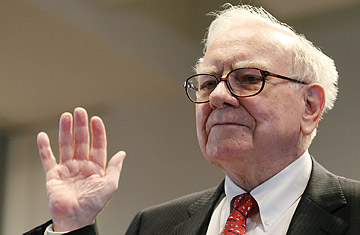
Warren Buffett, chairman and CEO of Berkshire Hathaway, is sworn in to testify before the Financial Crisis Inquiry Commission in New York City
(2 of 2)
Other witnesses, including Buffett and Moody's CEO Raymond McDaniel, kept coming back to a different point: that the severity of the housing downturn caught practically everyone off guard. The real culprit in the breakdown of so many ratings, they held, wasn't a lack of corporate integrity or analyst independence but the unforeseen national drop in home prices. "The entire American public was caught up in the belief that house prices could not fall dramatically," said Buffett. "That's the nature of bubbles — they become mass delusions."
But as the day of testimony illustrated, even mass delusions have their moments of clarity. One of those came from inside Moody's, in late 2006, when Mark Zandi, the firm's star economist, warned that some markets might be due for a housing crash. Why, the commissioners wanted to know, had more not been done to adjust the mathematical models that largely guide the thinking about how likely various bonds are to default? Nicolas Weill, a group managing director, said that in early 2007, a large group was in fact brought together to address changes in the housing market and the increasing tendency of borrowers to not pay back their loans. Was there a problem with the loans as they were being originated? Was servicing the issue? Could it be the economy more broadly? "We put together a lot of people to try to think through those issues," Weill said.
But the changes made were incremental. Between 2000 and 2007, Moody's gave some 42,000 tranches of mortgage-related bonds the firm's highest AAA rating. That implied the bonds were as likely to default as U.S. Treasuries. Meanwhile, only a handful of U.S. corporations warranted such an exalted rating. As a number of commissioners pointed out, what was glaringly missing at Moody's was any bigger-picture thinking about whether the system itself made sense.
Ratings companies are far from the only cog in the financial apparatus to have broken down — the Financial Crisis Inquiry Commission is holding hearings on a broad swath of topics, from subprime lending to shadow banking. And even to the extent that faulty ratings bear responsibility, it is difficult to pin all of that on the ratings firms themselves. Both investors and regulators rely heavily on the opinions of the ratings firms, often to the point of forgoing their own good judgment. That problem supersedes the practices of any one firm, which is why some of the legislation before Congress would try to diminish reliance on ratings.
Nonetheless, important themes come from studying Moody's specifically. A company is always going to be shaped by the parties that pay it — in this case, bankers — even if the product the firm is selling is relied on by a different set of people. While it may be easy for individuals to warn of looming disaster, being able to shift an entire group's mentality is close to impossible. And perhaps most important, when times are flush, people get swept up in the momentum of large organizations, especially in the absence of well-defined checks and balances. (Two of the day's best moments came when commissioners dressed down Buffett for not paying closer attention to the company as one of its major owners, and when CEO McDaniel explained how he writes his own performance reviews and then submits them to the firm's board of directors — which he chairs.)
"You're not going to be able to solve fundamental problems with a single bill," said commission vice chairman and former Congressman Bill Thomas. That is true in a literal sense. Although Congress is wrapping up its financial-overhaul legislation, the nitty-gritty details will unravel slowly over months and years as agencies like the Securities and Exchange Commission write new rules. But it's also true more universally. As Robert Graham, a commissioner and former Senator and Florida governor, asked time and again: Why do we consistently ignore warning signals until they mature into full-blown catastrophe? That is a question about human nature as much as it is about the financial system. Getting even slightly closer to an answer would be true triumph.
